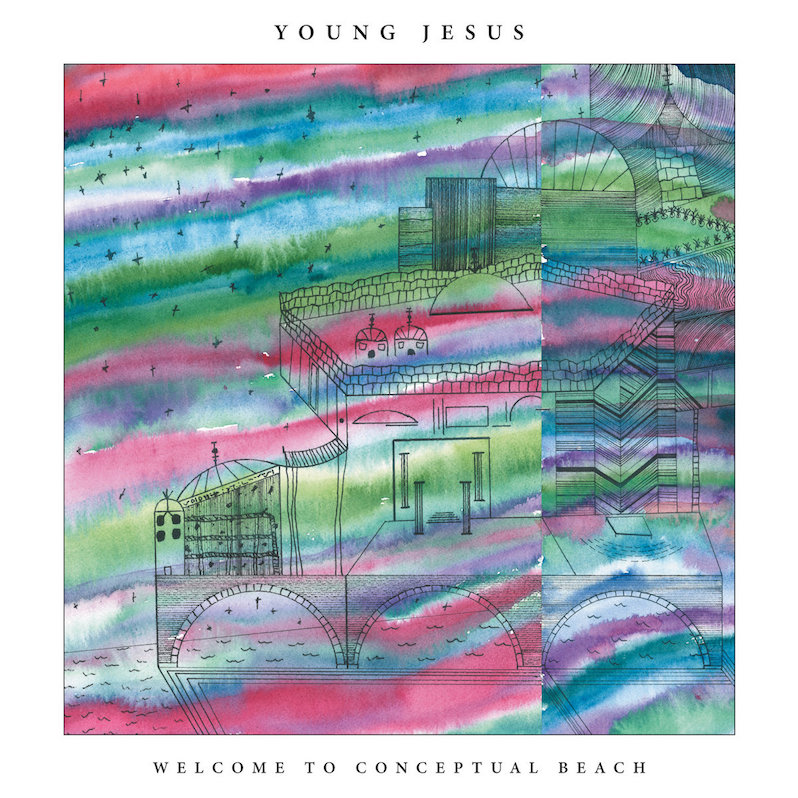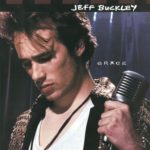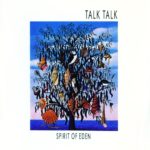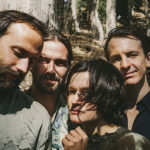Young Jesus – Welcome to Conceptual Beach

“Every record needs a thesis, needs a crisis, or campaign,” John Rossiter sings on “Root and Crown,” the fifth song on his band, Young Jesus’ new (and best) album, Welcome to Conceptual Beach. Young Jesus is actually the kind of band whose records have theses; they make dense, intellectual rock music with lyric sheets that read more like poetry than bars. And if “Root and Crown” does present a thesis for Welcome to Conceptual Beach, it’s about moving beyond the mind, or at least a singular consciousness. The album’s title refers to Rossiter’s idea of a mental refuge where all needs are met, and Rossiter has even expanded it to become a space for him and all of his bandmates, a collective hideout between souls. This is telling, because Young Jesus has reached a point where it sounds like all the members are of a hive mind, working as extensions of one collective drive to make music. Usually, this moment is when a band drops a big album, one they’ll be remembered for, one that they might make a whole career on. I’m willing to bet that Welcome to Conceptual Beach will be that record for Young Jesus. They’re taking risks that almost no other band is right now, and moving toward an influence-agnostic sound that feels radical.
The first time you might realize just how far Welcome to Conceptual Beach will stray from what is generally considered “rock” music is when the saxophone bursts into “Pattern Doubt.” It sounds cheesy as hell and also transcendental. Eric Shevrin’s keys practically shimmer as they run up and down the scale. It’s positively Alice Coltrane-esque. “Pattern Doubt” is mostly an instrumental piece, a lesson in reframing instruments in new contexts. But the lyrics that do appear are cogent: “Show me how you relax or rather, tell me how’d you’d live if you could live like that / I’ll show you how I get mad or rather, how I judge the world and how a pattern doubts.” Attempting to build a bridge between your mind and someone else’s is a terrifying and rewarding prospect, as relevant to a romantic relationship as it is to a group of musicians.
The influence of jazz shows up throughout the record. Kern Haug’s drumming is less a backbone and more of an exoskeleton, flexible and varied. He will switch between grooves moment to moment, adding levity to such thematically heavy songs. “Meditations” is one of Haug’s best showpieces, as well as clear proof of how these four have melded into one. It begins with and returns to improvised passages that sound like Sonic Youth at their peak, making sound with guitars full of ambiguity and energy.
And with the final two songs on Welcome to Conceptual Beach, both of which cross the 10-minute mark, Young Jesus will invite Talk Talk comparisons, playing a kind of ambient-jazz-rock-post-rock mixture that meanders to brief shocks of ecstasy. These tracks, “Lark” and “Magicians,” wouldn’t work if there wasn’t complete trust between these guys. I think of Big Thief, who had a similar level up as a band last year. What these two groups share is that the synchronicity practically jumps out of the speakers. And great musicianship individually and collectively makes the whole thing go down easy, especially the philosophy heavy lyrics. It helps that Rossiter has changed his vocal style considerably. Instead of doing the scream-shout that’s become canonized in punk music, he’s singing now, and singing beautifully. His voice sounds somewhere between Jeff Buckley and ANOHNI, a rich deep tone that carries the empathy of these songs on its shoulders.
Nominally, Young Jesus is an indie rock band. At their inception, they were emo, but they outgrew the label. Likely, they’ve outgrown indie rock too. If they need to be categorized, art rock is probably the most accurate (for now), but this is music that plays fast and loose with norms and expectations. The first time we hear Rossiter’s voice it’s put through vocal manipulations, rising and falling outside of his control, as he sings, “How a faith becomes profound, a lake lifts from the ground, find the demon and dove both share, in the evening you dress with care.” As the song progresses through atonalities and swing-for-the-fences emotion, Rossiter attempts to locate and understand what powers our belief despite incredible trauma. “That’s how we live, between pain and hopelessness,” he sings later, elaborating, “imperfection never leaves, and the pain you feel you’ll always feel a bit.” In the end, he’s shouting a repeated refrain like it’s 2012 and he’s in an emo band again. What is he shouting? “We just might grow.” He knows this well; Young Jesus certainly has.
Label: Saddle Creek
Year: 2020
Similar Albums:
 Jeff Buckley – Grace
Jeff Buckley – Grace
 Talk Talk – Spirit of Eden
Talk Talk – Spirit of Eden
 Big Thief – Two Hands
Big Thief – Two Hands

